
Kelli O'Hara
Kelli O'Hara, the four-time Tony nominee who has dazzled Broadway audiences in South Pacific, The Pajama Game and The Light in the Piazza, can currently be found Off-Broadway at Playwrights Horizons in the new Michael Korie-Scott Frankel-Richard Greenberg musical Far From Heaven, based on Todd Haynes' acclaimed film of the same name. The versatile soprano, who is pregnant with her second child (she's married to actor-musician Greg Naughton), plays 1950s housewife Cathy Whitaker, whose entire world changes as she is forced to confront the secrets of her closeted husband and the racism of 1957 suburban Connecticut. O'Hara, who is dressed to the nines in period-perfect outfits by Tony winner Catherine Zuber, is offering one of her finest performances to date, fully bringing to life the kind-hearted, stoic Whitaker, who tries to maintain her world and her dignity as her life unravels, ultimately forced to let go of the one relationship that sustains her through this difficult passage, a friendship with her African-American gardener Raymond (Isaiah Johnson). Earlier this week, I had the chance to catch up with the theatre favorite, who will also be seen—opposite Far From Heaven co-star Steven Pasquale—in Jason Robert Brown's Bridges of Madison County, when that new musical arrives on Broadway in January 2014. O'Hara spoke about the challenges of her current role in the Michael Greif-directed Far From Heaven as well as her forthcoming return to Broadway; my interview with the multi-talented artist follows.
Question: When and how did you get involved with Far From Heaven?
Kelli O’Hara: Well, I guess it’s been probably two or three years. Scott Frankel actually came to my house when we were living up in Westchester, very sweetly, and sat down at my piano and played the score for me, which was amazing for him to do… It’s the first time that's ever happened to me… I used to read things like that about Mary Martin and Lerner and Lowe, who would sit down with her and play her the score. And, didn’t [Martin] say [after they first played her the score for] My Fair Lady, "Oh boys, you’ve lost your touch!" [Laughs.] I didn’t say that to him. I was extremely, extremely pleased. And, from there we just did workshops at Playwrights for a couple of years, and then we did Williamstown last summer.
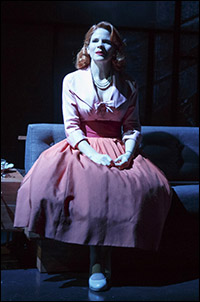 |
||
| O'Hara in Far From Heaven. |
||
| photo by Joan Marcus |
O’Hara: Well, a couple of things. The most immediate thing was that it was a brand-new show. It was just after I’d done South Pacific, and it was a role that was a drama, a dramatic musical, set in the fifties, which I felt was something that I had done, but [it wasn't] a comedy, a cheerful thing, it was more of a dramatic role. Also, it was a challenging score, one that I feel like I kind of come from. I do a lot of these wonderful revivals that I just love, but I actually come from [a world of] opera studies, all the art songs, all the modern music. It just really appealed to me to try to stretch my voice again and get back into this kind of place where I was doing things that were brand new. Question: Were you familiar with the movie at that time? Did you go back to watch the film?
O’Hara: You know what, I had never seen the movie… I never really try to watch the movie of the things I’ve been in. My reason for that really has nothing more to do with [the fact] that I just don’t want to be influenced in any way… Our genre is so different—once you start to musicalize something, and there are certain aspects and subtleties in film that can happen that we don’t have the luxury of having, and I just wanted to take the source material and also the new material that’s added, and there’s so much of it because it’s musicalized, and go from there. I had heard about the movie because I knew that Julianne Moore had been nominated for an Oscar for it. I remember those Oscars, but I just never went back to see it. Actually, because I’ve heard so much about it, I probably will once we close, and I expect I’ll have lots of regrets about things I didn’t do. [Laughs.]
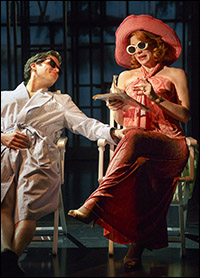 |
||
| O'Hara with Steven Pasquale in Far From Heaven. |
||
| Photo by Joan Marcus |
O’Hara: Oh, thank you so much. I appreciate that. I think [Cathy is] a really interesting person—she’s not as much of a heroine. She’s not [that] kind of leading lady, [which] is the challenge of her, in a movie or a musical, but especially a musical. I think for a 2013 audience, people want to see this woman, who's balls to the wall, and has a lot to say and a lot of certainty. The thing about her that’s hard and fun to play is her absolute kind of vulnerability, and finding things that she doesn’t start [the show] with. That’s really good to play with, so I think the material, without the film, gave me all that.
Question: How much changed from Williamstown to New York? And, are changes still being made?
O’Hara: We can’t really make changes anymore, although I think that we could every day with this, only because you discover it’s so layered. Obviously, we're talking about not just one love story – some musicals have only one thing – this has several different layers of really important, big stuff. We made a lot of changes I feel from Williamstown just as far as structure… Even though it’s 1957 and there’s this kind of person that a lot of us can’t identity with anymore – this wife of an alcoholic, this woman who’s really kind of more concerned with the way things seem than the way things are, which is not really someone who I think I am – but we also needed her to be someone who a person, a woman in today’s world, could identity with or feel for. So I told them I felt very strongly that the ending needed to have some sort of hope. She’s entering the 1960s, she’ll be a single mother soon after the story ends, and we need to believe that she’s gonna have a little bit of a backbone to take her children into it, and she also had more of a liberal idea about things. She didn’t have a problem with the black gardener, the way everyone in the whole story did. I discovered very quickly that you had to play her a little naïve and vulnerable in order to have her be understood, but then the ending has to have a little hope. So we changed the structure of the ending a lot. We didn’t have the train station [in Williamstown], we didn’t have the last song, we didn’t have really the music of hope at the end. We added a lot of those things; we also took out a lot of the more musical theatre-y fun songs that were in there. I think the creators decided that they didn't need to apologize for the story, we just needed to tell it. I really admired them for that because they said, "Let’s just tell the story the way it needs to be told." So they took out anything that seemed small and trivial.
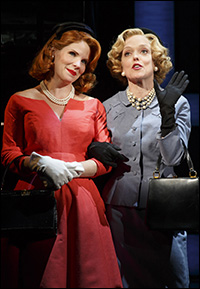 |
||
| O'Hara and Nancy Anderson |
||
| photo by Joan Marcus |
O’Hara: Yeah, you know that’s the funny thing. Again, I go back to the first things I did in my [performing] life, in college, right out of college, doing these things that were more sung-through, I would say more artsy maybe. At first it was the through-sung passages that I remembered familiarly and said, "Oh, this is nice." But now it’s the moments where we stop. Because of the through-sung nature of it, the heightened nature of it, when we do stop and talk, I do feel those are extremely important and I really enjoy them and kind of look forward to them. Question: I think the relationships are so strong—they’re very believable, between you and Nancy Anderson’s character, and you and Raymond, the gardener. Did you work a lot on them or did that chemistry just happen?
O’Hara: Nancy and I have gotten to work on it for [awhile]—we did Williamstown together as well. I think she and I have a very similar sensibility, kind of as if this isn’t our first life. [Laughs.] This isn’t our first trip to the rodeo here. We have the same sort of sensibility as far as the old-fashioned ways, the women who raised us, so I think there’s an understanding there of what we’re doing and what we’re playing. She would understand Cathy Whitaker just as much as I understand Eleanor, which is to say we both understand each other’s character very much. Not that we’d be proud to understand those characteristics, but we do. So that’s something that I have to admit kind of came easy with Nancy and me, and I’m very very grateful for that. I’ve enjoyed working with her so much. Isaiah is new this time. Brandon Victor Dixon played it at Williamstown, and it’s very interesting because they’re extremely different in both wonderful good ways. Isaiah, what I’ve found with him, I've really enjoyed the kind of chemistry that I feel like we have. He’s very easy to get to know, he’s very open, and…I think he lived in the South for a while, [so] he understands what he's doing, the man he's playing, even though it’s Hartford. Sometimes I think you have to grow up in the South in the eighties to know what the fifties were like in Hartford. [Laughs.] And I think he did, although he’s from Alaska, he did have some time in the South. I’ve really enjoyed his strength. First of all, he’s very handsome and a very strong man, and that is appealing to me as an actress and also as Cathy because there’s a bit of her that needs a lot of something to lean on during the show.
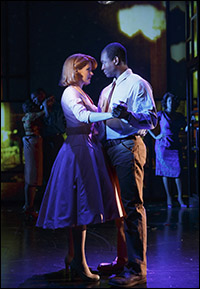 |
||
| O'Hara and Isaiah Johnson |
||
| Photo by Joan Marcus |
O’Hara: You know, with this particular subject matter, I don’t have a lot of personal experience to pull from. Thankfully, I’ve never gone through that with a man. What I do know is that when material is written in a way that feels natural to you, which is to say it’d be different if he hit me and I fell into a puddle. That would be harder for me. What’s actually more human to play is to cover things up. It’s much easier to play that than it would be to play… a victimized person. I do have to keep her vulnerable because I’ve learned, again, that that’s the way people can identify with her because if you think she’s too strong, then you wonder why she doesn’t just pack her bags, so she’s a very difficult person to kind of balance out. What does feel right to me from people I’ve known, from experiences I’ve seen is… I’m a mother, and when you have children, there’s a protection. You’ll do a lot to protect them, to do what’s best for them. At that time, what happens to her family is unheard of, and she’s going to do anything to make sure that’s kept for as long as possible inside. For a lack of a better word, in the closet because that’s just the time of where we are. So playing it is actually easier because it’s done more realistically, which is to say she would hide it, she would hold it in, she would protect it until she can’t anymore. I remember watching Next to Normal and things like that, where I think, "How can a person do this night after night? It’s grueling." There’s something different about covering than completely emoting every single night, and you want the complete emotion once in a while as an actress, but I find that this is kind of a train that you step on. It's a natural movement, and it’s not as hard as I thought it was. It’s definitely a journey, and it’s definitely a ride, but it feels naturalistic, it doesn’t feel like a lot of put-on work.
Question: You mentioned children – when are you due?
O’Hara: I’m due in September with my second.
Question: How has it been playing this role while being pregnant?
O’Hara: [Laughs.] Well, you know, in a perfect world we would’ve started a little earlier. I did South Pacific until I was about five-and-a-half months pregnant and after that I did concerts. I think the hardest part [with this production] was being in rehearsal and tech and previews because I was on my feet all day. There’s something that happens to your body around six months, where it just starts to really make room and change, and I thought, "Hmm this is going to be really tricky." And then somewhere around after we opened and we just started running the show, my feet got used to the shoes and my body got used to the big crinolines and things. Lately, it’s been okay, and I think I can do three more weeks. I think the thing I worry about more than the way I feel is the way people think I feel. I get a lot of, “Oh, gosh, you’re in these shoes, you’re up and down those stairs…," and that’s the only thing that I don’t want. I don’t want people to walk away from the story with thoughts about the pregnant Kelli O’Hara when you should be thinking about Cathy Whitaker’s story. But that’s my only problem with it right now is that I look a little silly, I look a little rotund, but really I’m not worried about that. I have lots of railings, and the shoes are comfortable.
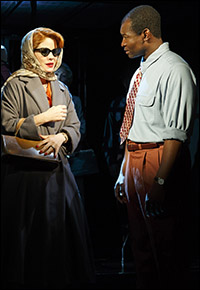 |
||
| O'Hara and Isaiah Johnson |
||
| photo by Joan Marcus |
O’Hara: Let me tell you. She goes crazy kicking in the same moments every night. It’s the funniest thing. There’s some sort of connection she has to – it’s usually when I’m with Raymond during "The Only One," the last of the first act. She goes crazy kicking, so I don’t know what that means, but when she’s born, I’m going to try to figure it out.
Question: That’s probably the most beautiful song, so maybe she has good taste already.
O’Hara: That’s probably what it means - she likes that song. Question: Is there talk of a recording?
O’Hara: There is, indeed, and I believe it’s happening. I believe it’s pretty certain, which I think is really important because the music is so eclectic. Once you listen to it, you can’t get it out of your head. It's really wonderful; I think it deserves a recording, and I think we’re going to record in July after we close, and then it will be out for everyone to really enjoy and to get to know the show even more.
Question: Is there any talk of a transfer or another production?
O’Hara: There’s not right now or not that I’m aware of. It’s just one of those things that you never know, but I think that they would definitely love that.
Question: I know you were also attached to Bridges of Madison County, which is going out of town. Will you be attached when it comes to Broadway?
O’Hara: Yes, I will… It’s very exciting. I hate to miss Williamstown, but I’ll just be about to give birth, and that’s not a very sexy story. [Laughs.]
Question: What’s the score to that like because I love Jason Robert Brown's music, too?
O’Hara: It’s the best he’s ever written, and I’m a fan of his anyway. It’s one of the most beautiful scores – that’s just the amazing thing about where I am right now, which is hard having a baby at the same time. It’s kind of all come at once. I have these two amazing brand-new roles with amazing scores. It’s just too much to give up—I’m not going to do it! [Laughs.] I’m just so excited about that as well, so I just feel really lucky this year to be doing these things.
[For tickets visit PlaywrightsHorizons.org.]
Well, that's all for now. Happy diva-watching! E-mail questions or comments to [email protected].
PHOTO ARCHIVE: Four-Time Tony Nominee Kelli O'Hara on the Musical Stage






































